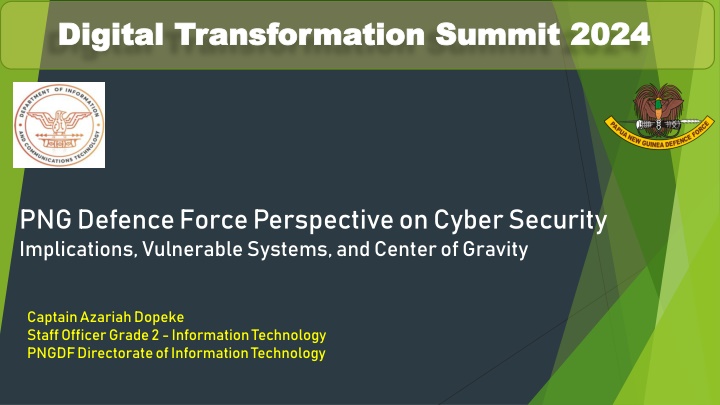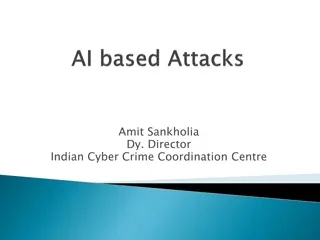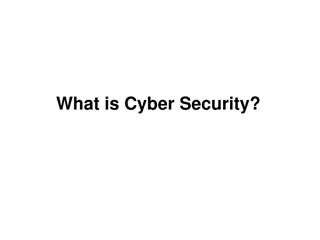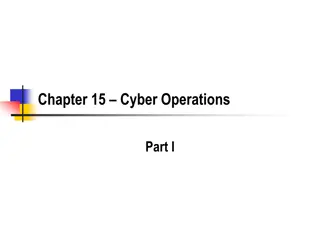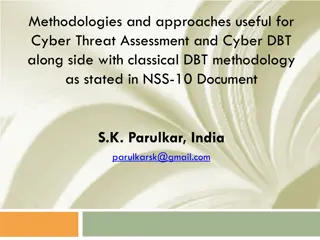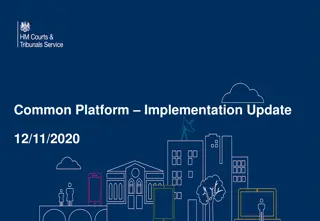Defence Force Cyber Security Insights 2024
The Papua New Guinea Defence Force (PNGDF) prioritizes cyber security in the digital transformation era, focusing on raising awareness, identifying vulnerabilities, and outlining strategic focus areas. With a commitment to excellence, the PNGDF enhances cyber capabilities to safeguard national defense and critical infrastructure.
Download Presentation

Please find below an Image/Link to download the presentation.
The content on the website is provided AS IS for your information and personal use only. It may not be sold, licensed, or shared on other websites without obtaining consent from the author.If you encounter any issues during the download, it is possible that the publisher has removed the file from their server.
You are allowed to download the files provided on this website for personal or commercial use, subject to the condition that they are used lawfully. All files are the property of their respective owners.
The content on the website is provided AS IS for your information and personal use only. It may not be sold, licensed, or shared on other websites without obtaining consent from the author.
E N D
Presentation Transcript
Digital Transformation Summit 2024 Digital Transformation Summit 2024 PNG Defence Force Perspective on Cyber Security Implications, Vulnerable Systems, and Center of Gravity Captain Azariah Dopeke Staff Officer Grade 2 - Information Technology PNGDF Directorate of Information Technology
OBJECTIVES 1. Raise Awareness 2. Highlight Implications 3. Identify Vulnerabilities 4. Define Center of Gravity 5. Outline Strategic Focus Areas 6. Promote Growth and Adaption 7. Encourage Proactive Measures 8. Foster Collaboration
OVERVIEW Brief Overview About PNGDF Introduction to Cyber Security in the PNGDF Cyber Security Implications Potential Vulnerable Systems Cyber Center of Gravity Strategic Focus Areas Conclusion
ABOUT US The Papua New Guinea Defence Force (PNGDF) is the primary military organization responsible for safeguarding the sovereignty and territorial integrity of Papua New Guinea. Established in 1975 following the country s independence, the PNGDF has evolved into a versatile and capable force, committed to national defense, regional stability, and international peacekeeping.
Commitment to Excellence Key Components Mission and Objectives Strategic Initiatives Land Element: Is responsible for ground operations and includes infantry, engineers, and logistics Primary Mission: Modernization: The PNGDF is focused on modernizing its forces, enhancing its capabilities through training, technology adoption, and strategic partnerships. Tri-Service Integration: Transitioning to a Tri-Service structure, the PNGDF aims to improve interoperability and operational efficiency across land, maritime, and air elements. Cyber Security: Recognizing the importance of cyber security, the PNGDF is gradually strengthening its cyber capabilities to protect its operations and critical infrastructure from emerging threats. The PNGDF is dedicated to National Defense: To Defend Papua New Guinea against external threats and ensure the security of its borders. Maintaining high standards of professionalism, discipline, and readiness. Through continuous training, strategic planning, and international cooperation Maritime Element: Comprising the Papua New Guinea Navy, protects the nation s maritime Supports: Internal Security Disaster Response International Peacekeeping Air Element: Provides aerial support for military operations, including transport, surveillance, and reconnaissance. The PNGDF strives to Fulfill its mission of safeguarding Papua New Guinea and contributing to regional and global security.
INTRODUCTION TO CYBER SECURITY IN PNG DEFENCE FORCE Cyber Security Landscape: The cyber threat landscape is constantly evolving, with adversaries employing increasingly sophisticated methods to disrupt, infiltrate, and exploit vulnerabilities. These threats pose significant risks to our operations, sensitive information, and overall mission success. Importance for the PNGDF: For the PNGDF, cyber security is not just an IT issue; it is a strategic imperative. Protecting our command and control systems, intelligence data, operational technology, and communications infrastructure is vital for maintaining our operational readiness and effectiveness. Any disruption or breach in these areas can have far-reaching implications for our national security.
Gradual Growth and Adaptation: Recognizing these challenges, the PNGDF is gradually strengthening its cyber security posture. We are investing in advanced technologies, enhancing our training programs, and fostering collaborations with national and international partners to build a resilient cyber defense framework. This growth is crucial as we aim to stay ahead of emerging threats and ensure the protection of our critical assets.. Strategic Focus: Our strategic focus areas include risk assessment and management, continuous training and awareness, fostering collaboration and partnerships, adopting cutting-edge technology, enforcing robust policies, building resilience and recovery capabilities, and establishing effective incident response and management protocols.
CYBER SECURITY IMPLICATIONS Reputation Damage Public trust and confidence in the PNGDF s ability to protect national security are crucial Operational Disruption Cyberattacks have the potential to severely disrupt our command and control systems, which are the backbone of our military operations. Operational Degradation Cyber threats can degrade our operational capabilities by targeting key systems and infrastructure Cyber Security Implications Intelligence Manipulation Cyber attacks can manipulate or corrupt intelligence data, leading to flawed decision-making and strategic miscalculations Data Breaches Unauthorized access to our sensitive and classified information can have devastating consequences Financial Costs Cyber incidents often come with significant financial burdens. The costs associated with system downtime, recovery efforts, and implementing mitigation measures can be substantial Insider Threats Malicious insiders with access to critical systems can cause significant harm by leaking information or sabotaging operations. Loss of Strategic Advantage Persistent cyber espionage by adversaries can uncover our strategic plans and weaken our defensive and offensive capabilities
POTENTIAL VULNERABLE SYSTEMS SYSTEMS VULNERABILITY COMMAND AND CONTROL SYSTEMS Significance: Nerve center of military operations, responsible for planning, directing, and executing missions. Vulnerabilities: They can be targeted for disruption, leading to loss of coordination and communication, which is critical for operational success. Impact: A compromised command and control system can paralyze our ability to respond to threats, coordinate operations, and manage resources effectively. INTELLIGENCE AND SURVEILLANCE PLATFORMS Significance: These platforms gather, process, and analyze critical information for decision-making and operational planning. Vulnerabilities: They are prime targets for espionage and data theft, which can lead to the exposure of sensitive intelligence. Impact: Breaches can result in the loss of strategic advantages, compromising our ability to anticipate and counter threats. OPERATIONAL TECHNOLOGY SYSTEMS Significance: This includes weapon systems, logistics platforms, and other mission-critical infrastructure. Vulnerabilities: These systems can be targeted to degrade or disrupt our operational capabilities. Impact: Attacks on operational technology can render weapon systems ineffective, delay logistical support, and impair mission readiness.
SYSTEMS VULNERABILITY INFORMATION SYSTEMS Significance: These systems manage administrative, personnel, and financial information essential for daily operations. Vulnerabilities: They are susceptible to data breaches, malware, and insider threats. Impact: Compromised information systems can lead to the loss of sensitive data, financial fraud, and administrative disruptions. TRAINING AND SIMULATION PLATFORMS Significance: These systems are used for preparing personnel, testing cyber defense capabilities, and simulating operational scenarios. Vulnerabilities: They can be targeted to manipulate training outcomes or disrupt preparation activities. Impact: Attacks on training systems can undermine our readiness by providing inaccurate training data and reducing the effectiveness of our preparedness programs. COMMUNICATION NETWORKS Significance: Secure communication is vital for coordinating activities across different units and branches. Vulnerabilities: Networks can be attacked to intercept, alter, or disrupt communications. Impact: Compromised communication networks can lead to miscommunication, operational delays, and exposure of strategic plans.
CYBER CENTER OF GRAVITY (COG) "The source of strength, power, or advantage that provides the primary support or balance to an entity's ability to accomplish its objectives. It is the critical element or factor that, if targeted or neutralized, can significantly impact the effectiveness and stability of a military force or strategic objective." Vital in Safeguard sensitive information, and uphold national sovereignty against evolving cyber threats. Protecting Sensitive and Classified information that provide crucial insights into enemy capabilities and strategic planning. INTELLIGENCE AND SURVEILLANCE PLATFORMS INFORMATION IS POWER
Main Strategic Focus Areas Risk Assessment and Management Implementing ongoing surveillance of systems and networks to detect potential vulnerabilities and threats. Developing and implementing plans to reduce identified risks, including technical safeguards, policies, and procedures. Training and Awareness Cyber security training programs for all personnel Awareness Campaigns Offering advanced training for IT and cyber security staff to stay updated Collaboration and Partnerships Joint efforts with national cyber security agencies International cooperation with allied forces and cyber security organizations Technology and Innovation Investment in advanced cyber defense technologies Research and development in cyber security Policy and Governance Establishing clear policies that define roles, responsibilities, and procedures for cyber security
CONCLUSION Cyber security is a strategic imperative for the PNGDF. By understanding and addressing cyber threats, identifying vulnerable systems, and securing our command and control systems, we can ensure the continued security and effectiveness of our military operations. Proactive measures, continuous growth, and strategic focus will enable the PNGDF to stay ahead of emerging threats and protect our critical assets.
